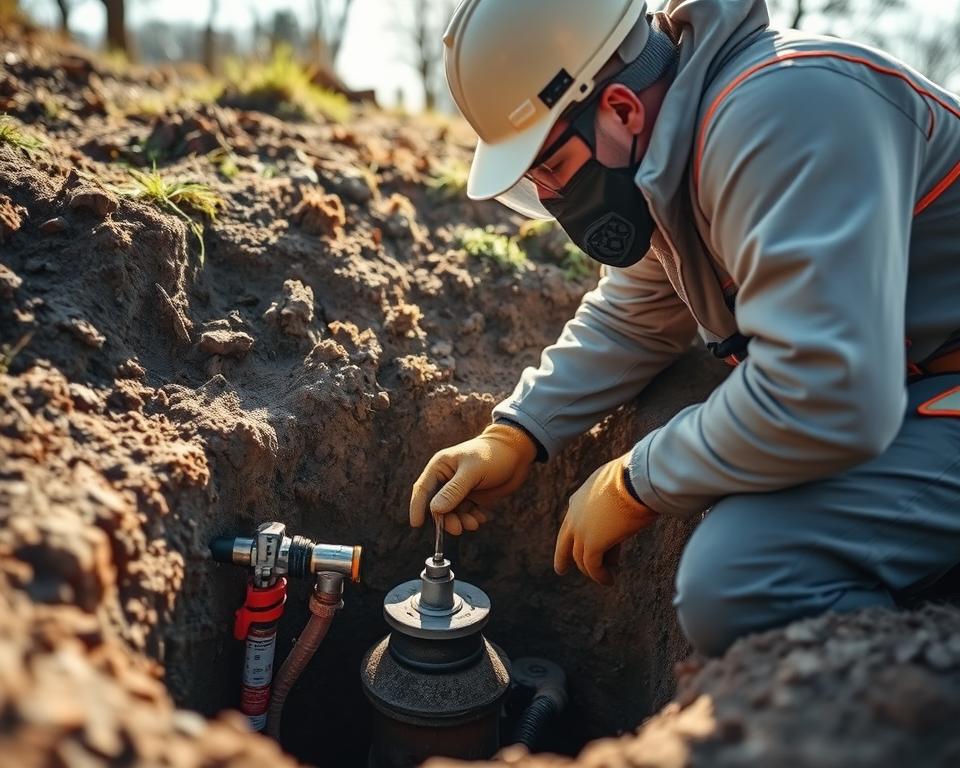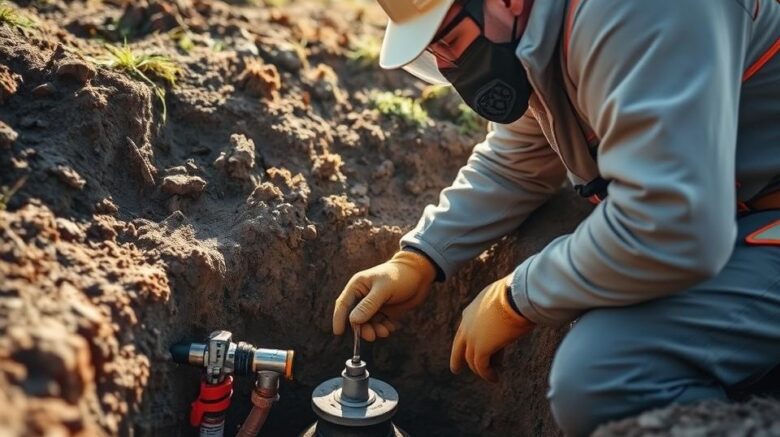Replacing a Septic Tank Pump: Step-by-Step Guide
Do you know the fallout of a Septic Tank Pump failure? For many, it’s a circumstance that leads to major stress and sudden financial hits. Realizing the requirement for timely replacement is vital in maintaining a efficient and clean Septic system. By scheduling regular check-ups, including prompt repair needs, you increase your system’s life while sidestepping pricey emergencies. Companies like All in Sanitation play a key part in maintaining your Septic tank working efficiently. This guide seeks to give a concise overview of Septic Tank Pump replacement, covering warning signs and upkeep suggestions for septic pumping cost.
Key Takeways
- Grasping the job of a Septic Tank Pump is vital for homeowners.
- Early Septic Tank Pump replacement can cut future costs.
- Routine upkeep and cleaning are important to lengthening the lifespan of your Septic system.
- Qualified service can effectively manage Septic system Pump repair and maintenance.
- Spotting preliminary clues of Pump failure can help prevent high repair bills.
Knowing Your Septic System
A Septic system is important for homes without access to public sewers. It manages household wastewater properly. The Septic tank is key to this system’s functioning, playing a vital role in the process.
The Septic tank receives sewage, separating solids from floatables. This separation is critical for proper wastewater treatment. The clarified water then flows to the drain field, where it experiences further treatment by the soil, protecting groundwater.
Being aware of how your Septic system operates can increase its life and efficiency. Consistent care is essential for the Septic tank and the system’s overall performance. Homeowners must familiarize themselves with their system’s specifics to protect the environment and bypass pricey renovation.
Septic Tank Basics
A Septic tank is a subsurface, leak-proof container critical for household waste management systems. It’s vital to grasp the Septic tank’s main function: it processes sewage waste storage by processing it. This setup acts by isolating solids from liquids, supporting basic wastewater treatment and sanitation.
Its operation hinges on naturally occurring microorganisms that decompose waste. In locales without centralized sewage treatment, Septic tanks are crucial. They retain sewage long enough for solids to descend, forming sludge. Meanwhile, liquid effluent collects above, making way for filtration in the drainage field.
Maintaining a Septic tank in good condition is critical for its effectiveness and service life. Consistent servicing is important to avoiding problems like backups and overflows. These situations can cause pricey restorations and pose risks to the environment. In essence, Septic tanks hold a key place in ensuring hygiene and safety, especially in rural areas.

Signs You Need a Septic Tank Pump Replacement
Homeowners should be mindful of signs that their Septic tank may need a new Pump. A definite sign is experiencing foul odors around drains or in the lawn, signaling a system failure. Dealing with repeated or serious sewage backups in your home calls for prompt action to stop worse issues.
Experiencing slow draining drains points to a potential problem. Household fixtures that take a long time to drain might indicate a Pump failure or a clog calling for an expert’s evaluation. Additionally, sections of excessively lush vegetation in your yard could mean trouble; this shows waste leakage, creating overflow concerns.
To prevent big and costly fixes, homeowners should deal with these symptoms quickly. Conducting periodic reviews and maintenance is vital for the Septic system’s peak function.
| Signs | Description |
|---|---|
| Foul Odors | Unpleasant smells around drains or yard suggesting system failure. |
| Sewage Backup | Recurring overflows in sinks or toilets indicating potential Pump issues. |
| Slow Draining Drains | Fixtures draining slowly can indicate blockages or Pump malfunction. |
| Lush Vegetation | Areas of excess growth near the tank indicating possible overflow. |
When to Change Your Pump
Understanding the timing for replacing your Septic Pump is crucial for a smooth-running Septic system. It’s sensible to have your system reviewed every three years. A qualified technician during these inspections delivers details into how well your system performs.
In most cases, service of the Septic tank becomes essential every five years. However, households with high demand or a big family might need annual service. Correct upkeep of your Septic system avoids expensive fixes and prolongs its lifespan. Specialists in Septic services can craft a maintenance plan that matches your demand and the characteristics of your system.
Keeping on top with Septic Pump replacements ensures your system’s efficient operation and shields your home investment. Periodic evaluations and service dodge surprise expenses. They support efficient system flow.
Replacement Cost Breakdown
The Septic Pump replacement cost changes, influenced by many aspects. Homeowners should prepare to pay costs of $500 to $1,300 for a new Pump. This price spectrum accounts for diversity in the kind of Pump and material needs. It’s vital to include the Pump and Septic tank servicing costs for the setup and mandatory inspections.
Costs can also climb due to problems within the Septic system or area labor costs. Needed fixes, triggered by wear or harm, could inflate the total outlay. In reviewing financial estimates for Septic services, consider charges for routine care, checks, and any emergency calls since these factors greatly help with maintaining your system’s longevity.
Planning financially for routine Septic service reduces the burden of unforeseen costs. Advance planning supports property owners in dealing with expenses related to the Pump’s replacement and system upkeep.
Steps in Pump Replacement
The Septic Tank Pump replacement commences with a thorough inspection of the system. This first check identifies any additional issues besides the Pump itself. The worn-out Pump is then removed safely and efficiently.
Installing the new Pump entails careful attention to connection security, ensuring no leaks. Specialist firms see that the installation is done correctly, reducing future issues.
The closing stage is a complete post-installation check. It confirms optimal performance, giving homeowners confidence. With expert help, the process is seamless, with little disturbance.
Tips for Installing Your Pump
When tackling Septic Pump installation, it’s critical to adhere to best practices. Using skilled professionals secures compliance with local regulations. They competently oversee the installation complexities, eliminating errors common in inexperienced setups.
Following stringent Septic service standards is important for harmonious performance. Using appropriate components and high-grade materials increases the Pump’s life and boosts the Septic system’s efficiency. This meticulous attention raises maintenance and overall performance longevity.
- Pick a reputable service provider who is experienced in Septic systems.
- Confirm that all necessary permits and inspections are in place before work commences.
- Use Pumps that match the specific requirements of your Septic system.
- Include a pre-installation inspection to assess site conditions.
- Keep in mind the layout and flow of the Septic system during installation.
Following these guidelines results in a smooth installation process. It also secures a dependable system for sound wastewater control.
Caring for Your Septic System
Stopping pricey troubles with your Septic system commences with routine care. By using easy guidelines, homeowners can maintain their Septic systems’ efficiency. Setting up regular checks is a prudent measure. It detects and address problems before they become significant.
It’s also important to not allow flushing harmful materials down the drain. Cooking oil, chemicals, and items that don’t break down can injure your system. Lowering water use during busy periods can also help the Septic system cope better.
Arranging specialist cleanings with entities like All in Sanitation is essential for Septic health. Learning what you must and must not do with your Septic tank can materially extend its lifespan and safeguard your household environment.
Septic Tank Cleaning Service Overview
Regular Septic tank cleaning is crucial for your system’s long-range function and efficiency. The process includes extracting sludge, checking for damages, and ensuring everything functions correctly. These steps are necessary to keep your system running smoothly and stop expensive fixes.
A comprehensive Septic maintenance plan should feature regular inspections and cleanings that suit your specific usage. Homeowners must recognize the importance of timely maintenance to avoid problems like backups. Hiring experts ensures the cleaning is comprehensive, fostering a hygienic home.
| Service Type | Frequency | Benefits |
|---|---|---|
| Pumping | Every 3-5 years | Prevents system failure and backups |
| Inspection | Annually | Detects potential issues early |
| Maintenance | As needed | Prolongs the lifespan of the system |
Investing in periodic Septic tank cleaning cuts costs and prolongs your system’s life. It supports uninterrupted waste treatment. Starting today safeguards your Septic system’s efficiency for the future.
Choosing a Replacement Service
Selecting a reputable Septic service provider is essential when replacing a Septic Tank Pump. Start by checking their certifications and licenses. Such credentials prove the company’s compliance with industry norms, key for a seamless replacement process.
Examining customer reviews is also a vital move. Past feedback indicates service quality, aiding in the filtering process. Opt for companies with a strong track record of excellent workmanship and customer support.
Acknowledge recommendations from your social circle too. Insights from friends and neighbors can unveil top-notch Septic services in your vicinity. Always ask for detailed accounts of their satisfactory experiences with these services.
Finally, assess the offering and cost from various firms. A careful analysis ensures exceptional service and maximizes the value of your expenditure. Following these guidelines secures your Septic system receives the top-notch care it deserves.
Deciding Between DIY and Pros
Homeowners often debate whether to tackle Septic issues by themselves or hire specialists. DIY Septic maintenance seems attractive for minor fixes and upkeep. For example, keeping an eye on levels or cleaning drains can be done solo.
In contrast, recognizing when to hire Septic professionals is vital for major faults. Heavy-duty repairs, replacing systems, or major clogs require unique tools and knowledge. Without the necessary skills, attempts to resolve these problems can create ecological hazards and major destruction.
Choosing between DIY and professional help calls for considering the job’s complexity. Presented below are examples demonstrating when DIY is adequate and when professional Septic services are advised:
| Situation | DIY Feasibility | Need for Professional Help |
|---|---|---|
| Routine maintenance (e.g., tank level checks) | Yes | No |
| Minor clogs in drain fields | Yes | No |
| Major Septic Tank Pump failure | No | Yes |
| Complex sewage backflow issues | No | Yes |
| Regular system inspections | Consider DIY | Yes for thorough checks |
Choosing wisely on these matters assures safety and efficiency. Choosing correctly safeguards the Septic system but also prevents surprise expenses.
To Summarize
Understanding the workings of your Septic system is crucial for its proper care and your home’s well-being. Recognizing early indicators of issues stops costly fixes and ensures the system’s integrity. This preventive approach benefits the environment and boosts your property value.
To maintain your Septic system in excellent condition, make sure of maintenance. This entails regular inspections and scheduled professional Pumping. This minimal cost secures your home’s safety and your family’s health. Your Septic system functions best with adequate service.
Our team at All in Sanitation is dedicated to providing first-rate Septic care. We bring the expertise required to ensure your system working optimally, protecting your home investment over time. With our commitment to exceptional service and trustworthiness, we’re ready to meet your Septic maintenance needs.
